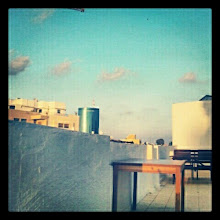It’s time for an Israeli Thanksgiving.
I was thinking of ranting about how Tzabarim/Sabras almost always assume Thanksgiving is a Christian holiday, but playing the embittered Anglo card is getting old. Perhaps this train of thought is induced by one too many forkfuls of turkey and cranberry sauce, or from the separation from family and family (dys)functionality during this time of year. Whatever the reason, I know I’m not the only Anglo nor Sabra who’d be interested in an Israeli version of Thanksgiving.
(While this post is meant to be written in Hebrew, and will be shortly translated, for the sake of blurring border I’m leaving it in English.)
As I see it, there are three central themes to Thanksgiving: family/communal gathering, giving thanks in a secular format, and celebrating post-immigration freedom. Each has an aspect in the current roster of Israeli holidays, yet they often appear alone or in pairs.
A family and/or communal gathering in Israel takes place more often than not, sometimes not even needing the pretext of a holiday to take place. A tiny country plus a weekly holiday (ie Shabbat) make meeting up with loved ones more than easy. While there’s plenty to envy having that kind of nearby familiar comfort (so says the Anglo-Saxon here), is there something lost by being physically so close?
Having a family/communal-based holiday of giving thanks to all we have, with optional references to a Divine Being, is not present in the Israeli roster of holidays. Shabbat, Pesach, Sukkot, even the High Holidays – these days are all about gratitude, but attempts at changing their natures so as to include Israelis of all backgrounds and beliefs are a long way coming. A very tenuous argument could be made for the Yom HaZikaron/Ha`Atzma’ut 48-hour bloc, but with so many other emotions running through that time period, any Thanksgiving-like reflection often takes place afterwards. Another contender is Sigd, a holiday recently recognized by the government that was introduced by Ethiopian olim, which refers to the giving of the Torah and longing to return to Jerusalem. While it has religious overtones, and its Ethiopian particularism is often too exotic for many, it gets closer to what Thanksgiving means for many Americans – namely, post-immigration freedom.
Many Americans have been able to balance their ethnic and national pride without sublimating or elevating one over the other (think St. Patrick’s Day, Columbus Day, Cinco de Mayo, etc.), regardless of the content or expression of that pride. Thanksgiving has been claimed by all Americans as their holiday to retell their story of arrival. Recounting the journey one’s family took to get to the USA not only connects with the popular narrative of the Pilgrims seeking religious freedom, but strengthens one’s life in a country based on ideology like America.
The fact is that no American has to justify celebrating Thanksgiving to a Sabra, just as no Ethiopian has to justify Sigd or a Moroccan for Mimouna; these are hallmarks of our various identities that in an immigrant state like Israel have a place alongside and/or inherent within a burgeoning and single national culture.
Again, Yom Ha`Atzma’ut could play this role for all Israelis. I was watching TV at my friends after our annual Thanksgiving dinner in Tel Aviv, with an ad for a documentary about the Exodus 1947 refugee ship. I was too tired to think of it at the time, but this was the perfect parallel to what I am now trying to propose, namely focusing on the people that make up the State of Israel rather than the State as an entity unto itself.
I'll start thinking about a name for this holiday, as well as its specific observances, but in the meantime here is an approximation of what I'm talking about. It's a clip from Israel's answer to "West Side Story" -- it's old, blunt, and uses a word bordering on the in-PC/racist line, but it hearkens back to a time in Israeli and Jewish history when we were able to celebrate being Jews with Diaspora roots and Israelis simultaneously. The song's entitled "We're All Jews," and the lyrics are about that which unites Jews is stronger than what divides them. Simplistic and perhaps a bit too tribalistic for the Democracy Now fans out there. Warning: for those faint-heated among you, stop the clip at 3.50 lest you be subjected to a choregraphed version of this inter-immigrant lovefest.
01 December 2009
Subscribe to:
Post Comments (Atom)




No comments:
Post a Comment